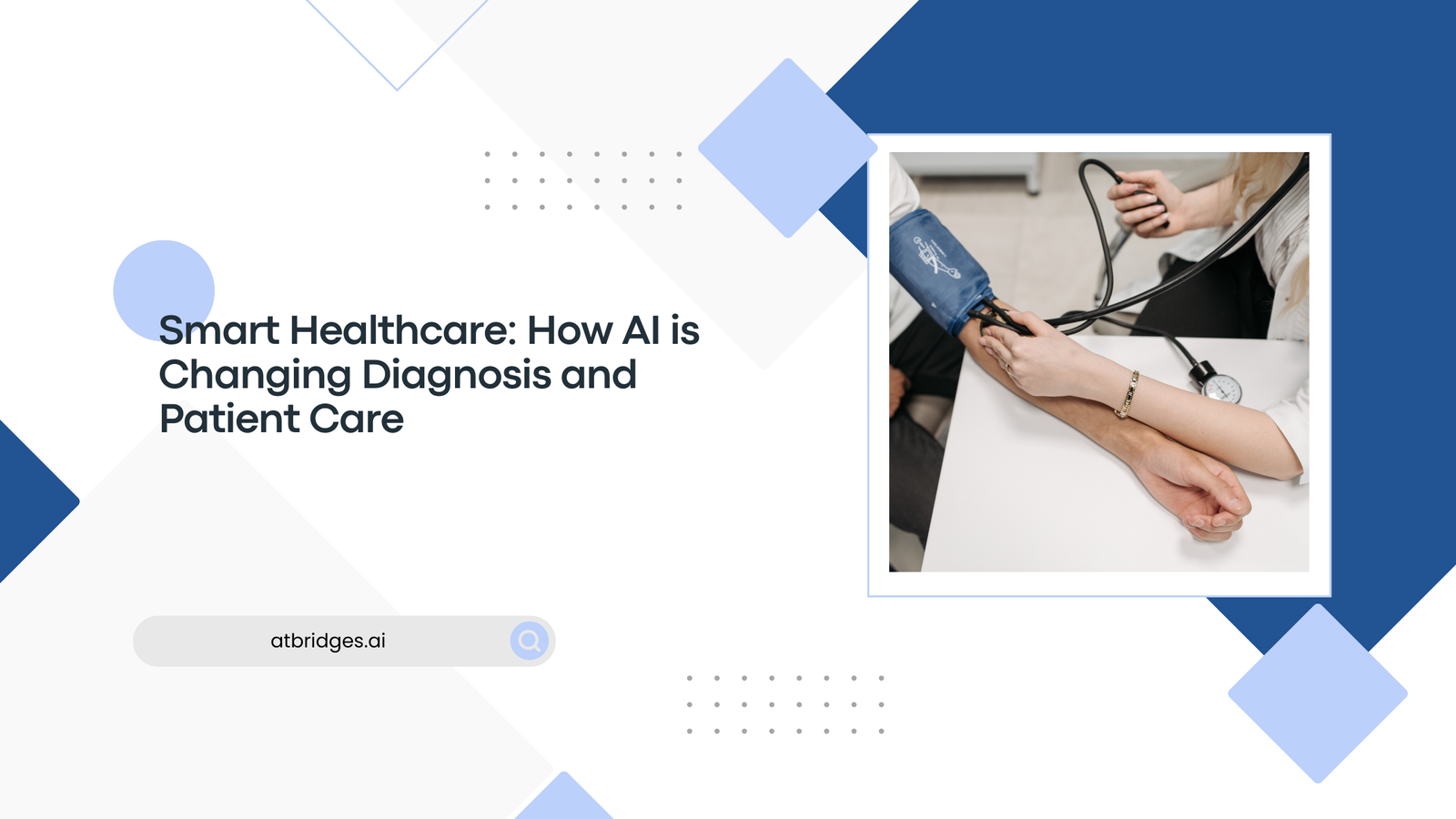Smart Healthcare: How AI is Changing Diagnosis and Patient Care

Artificial intelligence has been quite an influence in changing the health care sector to ensure that accurate diagnosis, treatment, and care are Copacetic for patients. How quality care relates to technology may then mean objective, made-to-order, and prompt healthcare in the future. We will explain in what way AI has been phenomenally changing the health care sector in this blog by going into details regarding its benefits, applications, and prospects.
Potential of AI in the Healthcare Industry
It is in the area of processing and analyzing vast amounts of data quickly and efficiently that AI holds real promise for healthcare. Through computer vision, natural language processing, and machine-learning algorithms, it reveals patterns and insights often hidden or undetected so far from human vision. Hence, AI will prove to be very useful and efficient in a host of healthcare applications, including the following:

AI-Powered Diagnostic Tools:
AI-driven diagnostic instruments are going to change the face of disease identification and detection. Such instruments have supreme accuracy in the analysis of medical pictures, including CT, MRI, and X-ray scans. They help radiologists and other medical professionals in accurate diagnosis by spotting irregularities and offering second perspectives. The main advantages consist of:
Greater Accuracy:
AI systems can identify patterns and abnormalities that the human eye cannot, hence reducing the chances of a misdiagnosis.
Speed:
AI is way faster compared to the human brain in processing data, which leads to a rapid diagnosis and subsequent planning for treatment.
Consistency:
Artificial intelligence reduces variability in diagnosis and treatment recommendations by providing consistent results.
Virtual Health Assistants:
The intention of a virtual health assistant is to serve and promptly respond to all types of queries that a health seeker may have. Such AI-powered assistants are capable of performing the following tasks :
Make Appointments:
Facilitate appointment scheduling to save administrative time so that timely attention can be provided to the patient.
Medication Reminders:
Help patients remember to take their prescriptions on time as possible to ensure optimum health and treatment adherence.
Symptom monitoring :
It facilitates proactive medical management by tracking patients' symptoms and giving recommendations.
Predictive analytics can be used in disease management :
One of the exciting uses of AI in healthcare is predictive analytics. Artificial intelligence can efficiently manage chronic diseases and even predict the course of the disease by considering corresponding patient data. This capacity, amongst several factors, gives healthcare providers the advantage to be able to:
Predict Potential Disease Outbreaks:
Artificial intelligence helps foresee impending outbreaks due to tracking trends and patterns that prompt timely action.
Manage Long-Term Diseases:
Identify patients who are most likely to develop complications, then work out ideal treatment plans for such patients.
Reduce Readmission:
Pinpoint patients that will likely need readmission; thus, with preventive measures in place, one has to support the enhancement of patient outcome while reducing expenses.
Personalized Recommendations for Therapy
AI is able to analyze the data of patients to provide them with personalized advice for treatment. Recommendations consider the specific genetic makeup, lifestyle, and medical history of the patient to give rise to highly tailored and effective treatments. Personalized care could result in:
Improved Outcomes:
Higher success rates are ensured with customized care for patients.
Fewer Transient Side Effects:
AI allows recommending treatments with fewer side effects, after considering the peculiarities of the patient.
Optimized Medication:
AI can help in determining drugs that are the best for a patient and avoid trial-and-error methods.
Simplified Administrative Duties
It can automate and optimize activities such as billing, coding, and appointment scheduling. A reduced administrative burden allows healthcare personnel to focus less on paperwork and more on the care of their patients. The advantages include:
Improved Productivity:
Much time is saved by health professionals for giving care to patients by way of automating
administrative, repetitive tasks.
Fewer mistakes are made:
Artificial intelligence will reduce the occurrence of errors in administrative procedures, like coding and billing, and increase precision and efficiency.
Cost Savings:
This will aid a health facility in cutting down operational costs by streamlining the administrative procedures.
Real-World Applications of AI in Healthcare
Artificial intelligence is not something to be applied in healthcare solely; it is already in use. It really is the case that the following are examples of AI at work, which points out that health care system may experience a revamping change in the world very soon:
IBM Watson for Oncology:
To help doctors develop a personalized treatment plan for cancer patients, IBM's AI engine Watson analyzes vast amounts of patient data and medical literature.
Google DeepMind Health:
DeepMind AI algorithms analyze medical imaging for the decline of patients to enable early therapies that do better outcomes.
PathAI:
Artificial intelligence helps pathologists detect some of the most common diseases in the world.
Healthcare AI in the Future:
The influence of AI technology on healthcare will only grow with its development. Here are some trends we must expect in the future:
Telemedicine :
Artificial intelligence will be a major player in telemedicine, offering remote diagnosis and treatment suggestions and increasing access to healthcare, particularly in underprivileged areas.
Robotic Surgery:
AI-driven devices will help physicians carry out accurate, minimally invasive procedures, speeding up recuperation and enhancing surgical results.
Advanced Drug Discovery:
Manifold possibilities arise when one considers how artificial intelligence can help find new, more powerful drugs faster by evaluating convoluted biological data and predicting various drug interactions with the human body.
Conclusion
AI has undoubtedly been changing the way health is being conducted. It opened new doors for diagnostic facilities and brought forward possibilities of treatment regarding patient care. Early detection and customized treatment plans are enabled through AI, while predictive analytics does its part to make life easier in terms of doing administrative duties. The future of healthcare, as we go on harnessing more and more the power of AI for the same, is brighter than ever in providing more personalized, efficient, and effective care to all.